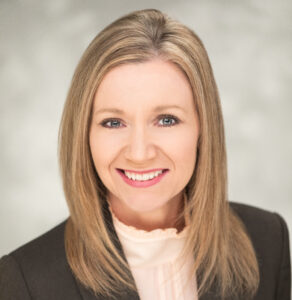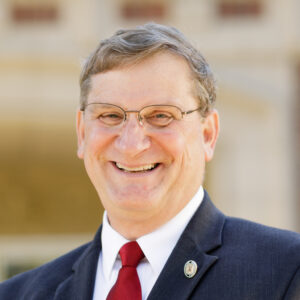Writer: Jerrica DuBois
2 min read April 2022 — The number of businesses relocating to Charlotte and new businesses opening has created an overwhelming need for talent, putting an increased pressure on higher education institutions to churn out quality, workforce-ready candidates. Kandi Deitemeyer, president of Central Piedmont Community College, and Fred Whitt, president of Lenoir-Rhyne University, shared with Invest: their thoughts on the challenges and opportunities facing the higher education sector in the Queen City.
What do you think are the challenges for the next year?
 Kandi Deitemeyer: Central Piedmont’s challenges relate to people. For prospective students, it’s helping them understand that we have the capacity and resources to help them be successful. Charlotte-area employers are starving for well-trained talent. Central Piedmont can provide students with the skills and knowledge needed so they can enter an opportunity-rich workforce ready to go.
Kandi Deitemeyer: Central Piedmont’s challenges relate to people. For prospective students, it’s helping them understand that we have the capacity and resources to help them be successful. Charlotte-area employers are starving for well-trained talent. Central Piedmont can provide students with the skills and knowledge needed so they can enter an opportunity-rich workforce ready to go.
At the same time, the college is working hard to recruit and retain superb faculty and staff members. We know our team members have lots of opportunities outside the college, so it’s critical that North Carolina invests further in its community colleges and their employees. We need the best talent to educate, train and produce the best talent.
How will DEI initiatives become more ingrained in the structure of higher education?
 Fred Whitt: The United States is becoming more diverse, and we see that in every industry, including higher education. To meet our goal of being an inclusive, welcoming and diverse community, we must adapt to these changing demographics. Of course, it is not simply enough to say we are welcoming and inclusive. We must review our systems, budgets and policies to ensure that they are equitable. At Lenoir-Rhyne, we have invested in DEI. New initiatives include the formation of a DEI Council directed by our new vice president for diversity, equity and inclusion, and the establishment of the LR Equity and Diversity Institute, which is training not only our own faculty and staff but also business and community leaders across the region and country to be equity advocates. We hope this work—and programs to come—will position us in our region as a leader for diversity, equity and inclusion.
Fred Whitt: The United States is becoming more diverse, and we see that in every industry, including higher education. To meet our goal of being an inclusive, welcoming and diverse community, we must adapt to these changing demographics. Of course, it is not simply enough to say we are welcoming and inclusive. We must review our systems, budgets and policies to ensure that they are equitable. At Lenoir-Rhyne, we have invested in DEI. New initiatives include the formation of a DEI Council directed by our new vice president for diversity, equity and inclusion, and the establishment of the LR Equity and Diversity Institute, which is training not only our own faculty and staff but also business and community leaders across the region and country to be equity advocates. We hope this work—and programs to come—will position us in our region as a leader for diversity, equity and inclusion.
How are the school’s educational offerings changing?
Deitemeyer: National data has shown that students often perform better in shorter term classes – courses offered in terms shorter than the traditional 16-week semester format. With this in mind, we are moving to offer many more classes in eight-week sessions. Students tell us they like eight-week sessions because they provide more flexibility around their work and family schedules, plus they can move more quickly from course to course, which helps them complete their programs at a faster pace.
Coming out of the pandemic, lots of students want to move away from online learning. Therefore, we’re offering a mix of in-person, online and blended classes. The goal is to help students complete their programs by offering options that fit their needs.
Whitt: Lenoir-Rhyne has long been a regional hub for educating students in the health sciences. We currently offer accredited programs in nursing, nurse practitioner, public health, occupational therapy, and exercise science. We are considering the expansion of many of these programs and will begin the process of relaunching our physician assistant program this spring. Additionally, we plan to enhance our partnerships with the many outstanding community colleges in the region. In fact, we will host a summit later this month with eight community college leaders to explore new partnerships and initiatives in working collaboratively to meet the educational and workforce needs in the region. We also are considering programs in cybersecurity, supply chain management, information technology, data analytics, and respiratory therapy.
What is your outlook for the college in 2022 and beyond?
Deitemeyer: My outlook is always positive. Central Piedmont and Charlotte-Mecklenburg have a great future ahead of us, we just need to cease it. We have great people who care and want this community to grow while helping everyone benefit from the growth. Central Piedmont is one of the community’s most valuable assets in ensuring pathways to economic mobility are available to all. The college has long been the community’s chief workforce development partner, and we continue to take that responsibility seriously. The future is bright for Central Piedmont. We have the capacity and capability to deliver for Charlotte’s growth and success.
Whitt: Lenoir-Rhyne has served the higher education needs of our region well for the past 130 years, but we are not resting on our laurels. We are working to expand our existing partnerships with community colleges, businesses and industries to provide greater access and affordability to citizens in our region.
It has always been about the we and not the me in the Catawba County and Unifour region, and we are proud to be a part of that. New programs, 2+2 majors, certificate programs, shared advising, improved financial aid, and affordable pricing will enhance higher education in our region and be a significant contributing factor in making our region an attractive destination. Job opportunities, combined with affordable housing, quality of life, strong and varied educational institutions, and great healthcare are keys to economic development and growth.
Collaborative partnerships like ours that address the economic and educational needs of the region will be the new normal for higher education, particularly in our region. Those who continue to work in silos and resist change will fall behind.
For more information, visit:

